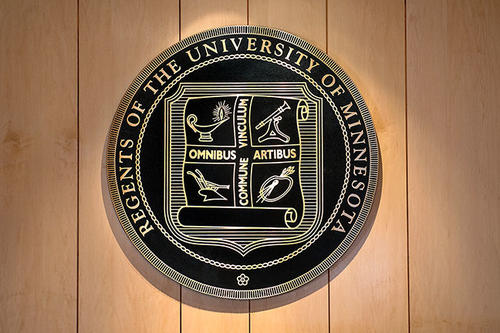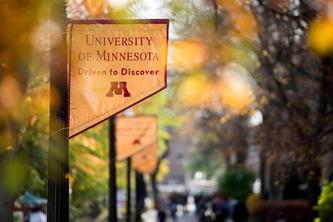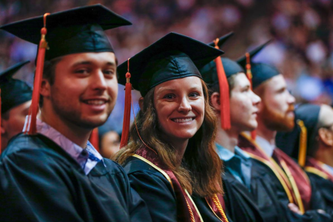
For University of Minnesota Physics Professor Dr. Cynthia Cattell, nagging fatigue a few years ago turned out to be something much more serious – an aggressive blood cancer that required immediate treatment.
Thanks to a drug developed at the U’s Masonic Cancer Center by Dr. Daniel Vallera, Cattell enrolled in a clinical trial that put her cancer in remission.
Cattell’s experience is one of many examples that shows the critical role private philanthropy plays in supporting research and bridging the gap before new ideas and treatments can garner funding from other sources, according to Kathy Schmidlkofer, president and CEO of the University of Minnesota Foundation (UMF), who included Cattell’s story in her annual report to the U’s Board of Regents today.
Schmidlkofer highlighted more than $312 million in total giving to the University of Minnesota during fiscal year 2016, the second-highest total ever, trailing only last year’s all-time record. That mark includes gifts from more than 72,000 donors, 56 percent of whom are U of M alumni.
In addition, UMF distributed a record $214 million to the University to benefit students, faculty, research, programs and other strategic priorities needed to maintain a world-class University.
Since President Eric Kaler took office in 2011, the U has received more than $1.9 billion in private support, underscoring strong donor confidence in the direction and leadership of the University.
“With support from so many generous alumni and donors, the University is able to provide an exceptional student experience and make lives better for Minnesotans and people around the globe,” said Kaler. “Thanks to strong philanthropy, we are well positioned to address successfully the grand challenges of a diverse and changing world. We will continue to move from good to great and towards the goal of excellence in all we do.”
Additionally, Schmidlkofer discussed the completion this year of the Vision 2017 campaign for medicine and health. Launched in fiscal year 2008, the campaign surpassed its goal over a year early, raising more than $1 billionfrom more than 77,000 donors over the last nine years. The gifts supported new student scholarships and fellowships, new faculty and research positions and new facilities such as the Biomedical Discovery District, Masonic Children’s Hospital, Clinics and Surgery Center, and more.
Success in Gopher Athletics
Donor support also extends to Gopher Athletics, which experienced a successful year in the classroom and in competition throughout 2015-16 thanks, in part, to the generosity of donors.
In his first report to the Board, Gopher Athletics Director Mark Coyle highlighted several accomplishments of the department’s 700-plus student-athletes across 25 programs, including:
- for the second year in a row, leading the nation’s public institutions in the percentage of programs winning Academic Progress Rate awards from the NCAA
- a fourth national championship in five years for the women’s hockey team; and
- six Big Ten titles, third-highest in the conference, trailing only Ohio State and Michigan.
Coyle also outlined the department’s NCAA compliance efforts, progress on facility improvements — including the Athletes Village, currently under construction – fundraising and financial planning for the department’s $105 million budget this coming year.
Academic and capital planning
Facility planning across the U system was also discussed by Regents during a review of the proposed 2016 six-year capital plan and 2017 state capital request, both designed to set priorities and direction for continued capital investment and funding support from the state Legislature. The Board is expected to act on these recommendations in October.
Additional projects proposed on the Twin Cities campus reviewed by the Board include:
Pioneer Hall and Superblock Dining Facility
Regents approved a capital budget amendment to proceed with a full renovation of historic Pioneer Hall ($81.7 million) and addition of a consolidated 850-seat dining facility in the Superblock ($22.8 million) — a highly desirable, first-year focused neighborhood consisting of four residence halls (Pioneer, Centennial, Frontier and Territorial) adjacent to the heart of the Twin Cities East Bank campus
The character-defining features of Pioneer Hall, which is in need of significant repairs, will be retained while the capacity will expand by 60 beds (totaling 756 beds). The renovation will also improve common areas, individual and group study/learning spaces and increase residence hall capacity for first-year students. Living on campus increases student academic achievement, retention and timely graduation while providing support services to prepare students to address the challenges of college life.
This project is one of several concurrent housing strategies to support student body growth called for in the Twin Cities campus enrollment plan, approved by the Board in March 2016. Together, the new dining facility and a renovated Pioneer Hall will match the experience offered in the popular 17th Avenue Residence Hall, which opened in 2013.
Athletes Village, Recreation Sports and Electric Steel Elevators
The Facilities, Planning and Operations Committee reviewed proposed plans to build a competition-level track and field facility near the Athletes Village. The track facility is a key component to the University’s commitment to gender equity and Title IX compliance.
To accommodate the track, the University must relocate a sports bubble and field currently on that site. The bubble and field, which serves Twin Cities campus students in intramural athletics, are recommended to move to land near TCF Bank Stadium. That land is currently the site of the Kurth Elevator and Electric Steel Elevator. A recommendation to purchase and clear the Kurth Elevator site was presented for review. The University owns the Steel Elevator land and the Committee also reviewed a resolution for demolition of the elevators currently on the site while preserving historic equipment and documentation of the elevators. The University is accepting comments on the proposed demolition through September 23 via email to [email protected]. The Board is expected to act on these proposals in October.
The Board also:
Reviewed the proposed FY18-19 biennial budget request, which benefits U students, faculty and Minnesota residents. The recommendation comprises three focus areas: student success, expansion of Minnesota’s Discovery, Research and InnoVation Economy (MnDRIVE) and core mission support. Board action is expected in October. More detail on the request is outlined in this press release.
Received a progress report on the human participant research protection program implementation plan. Columbia University ProfessorDr. David Strauss, a member of the 2015 external review team and an external consultant for the university's implementation plan, discussed his recent report regarding the U’s efforts which he found “reflect extraordinary resolve, effective leadership, and teamwork at many levels.”
Recognized new academic leaders. College of Science and Engineering Dean Samuel Mukasa and Law School Dean Garry Jenkins were formally introduced and new Regents Professor of Sociology and Law Christopher Uggen was recognized.
Read President Eric Kaler’s report to the Board here.
The Board will meet again Thursday, October 13 and Friday, October 14.
- Categories:
- Campus Affairs





